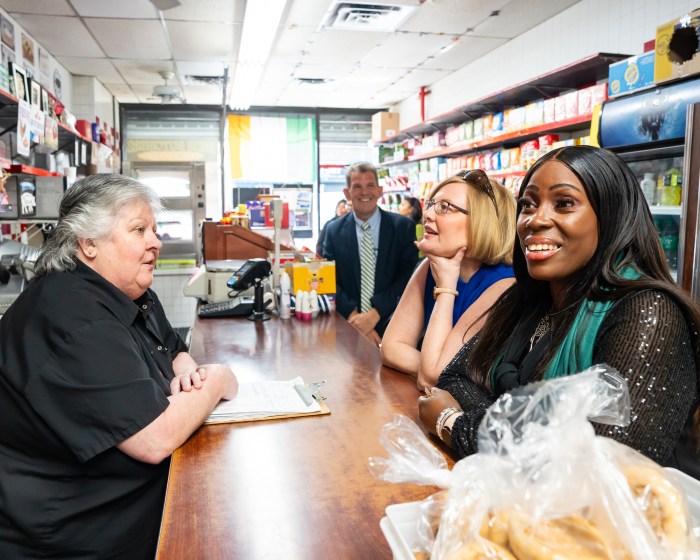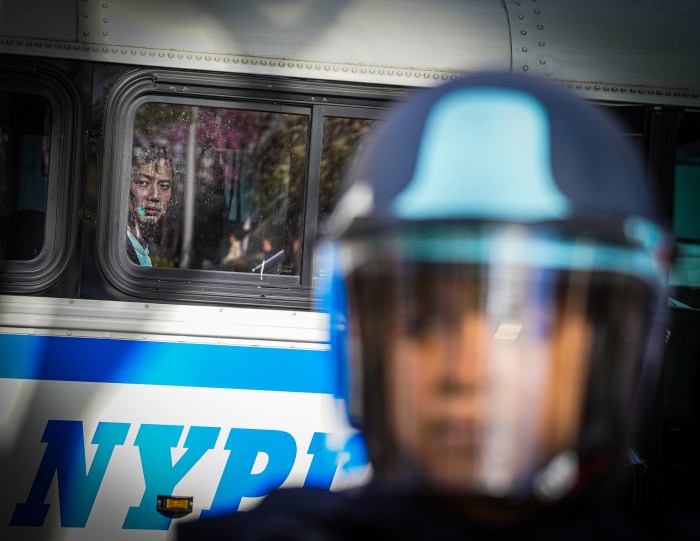BY TROY MASTERS | Late in their fifth day of deliberations, a Manhattan jury once again told Judge Daniel P. FitzGerald they were deadlocked in their deliberations over second-degree murder charges against Davawn Robinson in the 2009 strangling death of Edgard Mercado, a 39-year-old gay man.
After spending time on December 20 listening to read-back from Robinson’s trial testimony, the jury resumed deliberations for about 45 minutes late in the afternoon, only to return to the courtroom to inform FitzGerald that they could not come to a unanimous verdict on the highest of three charges against the defendant.
As the judge told them to resume their deliberations, at least three jurors –– two women and a man –– began to weep.
Jurors started deliberations on December 14, and by the following afternoon first signaled they had a problem.
“Clarification on what to do next,” they told the judge in a note. “The jury is deadlocked on murder-two.”
FitzGerald responded that they were very early in their deliberations and could not declare themselves to be deadlocked. Their deliberations continued on December 16, 19, and 20, and will resume on December 21, after the newspaper went to press.
The jury weighed second-degree murder, which has a maximum sentence of 25-years-to-life, second-degree manslaughter, which has a maximum sentence of 15 years, and criminally negligent homicide, which carries a maximum of four years. A defendant who is convicted of either of the two lesser charges would be eligible for release after serving six-sevenths of the sentence, but a second-degree murder conviction requires at least 25 years in jail.
Jurors had to consider the charges in that order and could not move on to manslaughter or criminally negligent homicide without first finding Robinson not guilty of murder and then manslaughter.
Before the jury returned to the courtroom after signaling their indecision on December 20, Annie Costanzo, one of Robinson’s two Legal Aid Society attorneys, told FitzGerald that the continued deadlock was forcing an “Allen charge,” a last ditch effort by a judge to press for a verdict by asking jurors in the minority to consider why the majority of their peers did not reach the same conclusion. Apparently unwilling to signal that he was at the end of his efforts to secure a verdict, the judge responded that he would issue a “modified” Allen charge.
After that, the jury returned to the courtroom one last time before the end of the day to inquire what the holiday schedule would be.
The prosecution’s case relied almost entirely on the testimony of Dr. Rachel A. Lange, the forensic pathologist in the city medical examiner’s office, who said that Mercado’s injuries showed he had been in a fight.
“All these injuries are indicative of somebody struggling to get away from a ligature,” Lange said during December 8 testimony. Autopsy photos that were put into evidence showed large, livid bruises that encircled Mercado’s neck, as well as scrapes and bruises on his cheek and jaw, above one eye, and behind one ear.
While Leila Kermani, one of two assistant district attorneys prosecuting the case, said Robinson may have killed Mercado as part of a robbery and noted that Robinson stole Mercado’s lap top computer and cell phone, the prosecution never established definitively what motivated Robinson. The prosecution is not required to prove motive, but jurors can consider it, or its absence, in their deliberations.
The prosecution charged that Robinson, who is 24 and also gay, intended to kill Mercado. The defense argued that Robinson never had the legally required intent to convict him of murder. The defendant first told police and prosecutors in written and videotaped statements that he acted in self-defense when he strangled Mercado in the older man’s Avenue C apartment. When Robinson testified, he said the death was an accident that occurred during an erotic asphyxiation session.
Robinson told jurors that he and Mercado met at a West Village gay bar. The younger man said he purchased cocaine on Mercado’s behalf and they then traveled to Mercado’s East Village apartment where they used the cocaine and drank wine.
At the apartment, Robinson said, Mercado showed him how to use the rope, which was part of a uniform the older man wore in a Brazilian dance class. Police found no sex toys, pornography, or bondage equipment in Mercado’s apartment. Robinson stood behind Mercado, he said, holding the rope that was wrapped around Mercado’s neck and hands. At one point, he dropped the rope.
“When I let go, he slumped over to the side,” Robinson said during his December 12 testimony. “At first, I was thinking he must be really messed up… I turned him over and I seen his face and I realized he was dead.”
In what he said was a panic, Robinson called 911 and spent 22 minutes telling the operator that he had killed a man in self-defense and was afraid that another man was coming to the apartment to kill him. He used the names Ted and Tony to identify that second man in various statements.
“I just made up a self-defense story,” Robinson told the jury. “I just was lying. I’m just throwing everything out there.” –– Additional reporting by Duncan Osborne

































